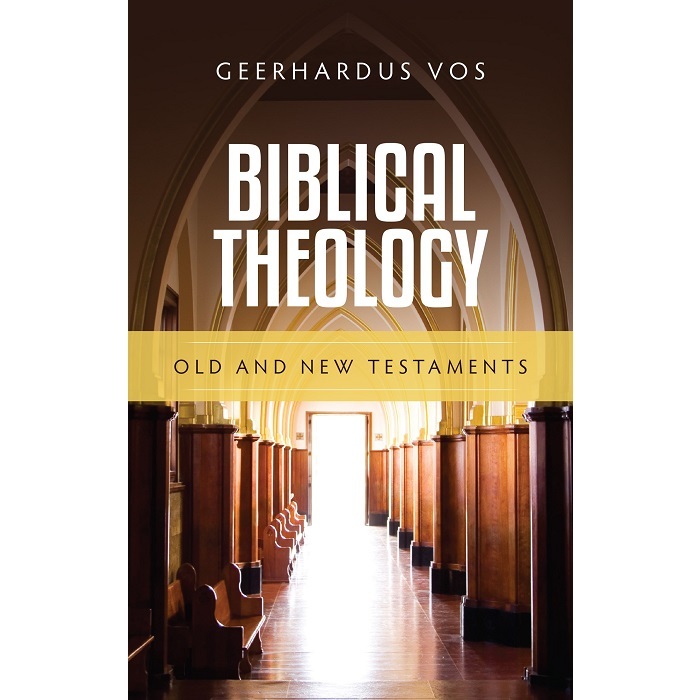Description
In the book Biblical Theology, Geerhardus Vos' aim is no less than to provide an account of the unfolding of the mind of God in history, through the successive agents of his special revelation. Vos handles this under three main divisions: the Mosaic epoch of revelation, the prophetic epoch of revelation, and the New Testament.
Such an historical approach is not meant to supplant the work of the systematic theologian; nevertheless, the Christian gospel is inextricably bound up with history, and the biblical theologian thus seeks to highlight the uniqueness of each biblical document in that succession. The rich variety of Scripture is discovered anew as the progressive development of biblical themes is replicated.
To read these pages – the fruit of Vos’s 39 years of teaching biblical theology at Princeton – is to appreciate the late John Murray’s suggestion that Geerhardus Vos was the most incisive exegete in the English-speaking world of the twentieth century.
Endorsements
‘Quite unique. A thorough study of this volume will abundantly repay the student of Scripture. We recommend it most heartily.’ — EVANGELICAL PRESBYTERIAN
'While Vos's primary vocation was as a theological professor, his writings are characterized by an evident orthodoxy and devout faith which breath a spirit of reverence and adoration into all his publications and explain why they are still highly prized among readers interested in a Reformed approach to biblical theology.' — JAMES M. GARRETSON
Table of Contents
The Old Testament
PART ONE
THE MOSAIC EPOCH OF REVELATION
1 INTRODUCTION: THE NATURE AND METHOD OF BIBLICAL THEOLOGY 3
Division of Theology into four great departments – definition of Biblical Theology – the various things successively designated by the name of Biblical Theology – guiding principles – objections to the name 'Biblical Theology' – the relation of Biblical Theology to other disciplines – the method of Biblical Theology – practical uses of the study of Biblical Theology
2 THE MAPPING OUT OF THE FIELD OF REDEMPTION 19
Pre-redemptive and Redemptive Special Revelation – the division of Redemptive Special Revelation – ‘Diatheke’
3 THE CONTENT OF PRE-REDEMPTIVE SPECIAL REVELATION 27
Four principles: life, probation, temptation, death – mortality and immortality
4 THE CONTENT OF THE FIRST REDEMPTIVE SPECIAL REVELATION 41
The three curses – ‘seed’ – human suffering
5 THE NOACHIAN REVELATION AND THE DEVELOPMENT LEADING UP TO IT 45
Cainites and Sethites – Revelation after the Flood
6 THE PERIOD BETWEEN NOAH AND THE GREAT PATRIARCHS 56
The prophetic deliverances of Noah – the table of the nations – the division of tongues – the election of the Shemites to furnish the bearers of redemption and revelation
7 REVELATION IN THE PATRIARCHAL PERIOD 66
Critical views – the historicity of the patriarchs – theophanies – the Angel of Jehovah – the Patriarch Abraham – the principle of election – the objectivity of the gifts bestowed – the promises fulfilled supernaturally – the divine name 'El-Shaddai' – faith as found in Patriarchal religion – ethical elements – the Patriarch Isaac – the Patriarch Jacob – election – the Bethel dream-vision – the wrestling at Peniel
8 REVELATION IN THE PERIOD OF MOSES 100
[A] The Place of Moses in the Organism of Old Testament Revelation 100
The prominence of Moses
[B] The Form of Revelation in the Mosaic Period 105
The pillar of cloud and fire – the Angel of Jehovah – the name and the face of Jehovah
[C] The Content of the Mosaic Revelation 109
[1] The factual basis. Deliverance from foreign bondage – deliverance from sin – a display of divine omnipotence – a demonstration of sovereign grace – the name ‘Jehovah’ – the Passover 109
[2] The Berith made between Jehovah and Israel 121
[3] The organization of Israel: the theocracy. The function of law 124
[4] The Decalogue. Of world-wide application – religious in character – the Ten Words – the First Word – the Second Word – the Third Word – the Fourth Word 129
[5] The Ritual (ceremonial) Law. Symbol and Type – the Tabernacle – the majesty and holiness of God – the place of worship – Christ is the anti-typical Tabernacle – the sacrificial system of the law – offerings, gifts, sacrifices – the relation between the offerer and his sacrifice – the stages of the sacrificial ritual – vicariousness defined – the meaning of 'covering' – the variety of offerings – uncleanness and purification – totemism – ancestor-worship – the animistic theory 143
PART TWO
THE PROPHETIC EPOCH OF REVELATION
1 THE PLACE OF PROPHETISM IN OLD TESTAMENT REVELATION 185
A kingdom-producing movement – the word as the instrument of prophetism – a factor of continuity – two main periods of prophetism
2 THE CONCEPTION OF A PROPHET: NAMES AND ETYMOLOGIES 191
The Hebrew term nabhi – the Greek term prophetes – the terms ro’eh and chozeh
3 THE HISTORY OF PROPHETISM: CRITICAL THEORIES 198
The History of prophetism – the origin of ‘nabhi’-ism’ in Israel, arguments and counter-arguments – did the later prophets create ethical monotheism?
4 THE MODE OF RECEPTION OF THE PROPHETIC REVELATION 212
The views of Kuenen explained – ‘kernel-revelation’ – the ‘divination’ theory – revelation through speech and hearing – revelation through showing and seeing – revelation through rapture – bodily effects – the intra-mental state – extreme critical views answered
5 THE MODE OF COMMUNICATION OF THE PROPHECY 230
Speech – miracles
6 THE CONTENT OF THE PROPHETIC REVELATION 234
[A] The Nature and Attributes of Jehovah 234
Monotheism – the nature and attributes of Jehovah – omnipotence – ‘Jehovah of hosts’ – Jehovah’s relation to time and space – omniscience – holiness – righteousness – emotions and affections
[B] The Bond between Jehovah and Israel 256
[C] The Rupture of the Bond: The Sin of Israel 263
Collective national sin – the corruption of ritual worship – Amos 5.25 – Isaiah 1.10-17 – Hosea 6.6 – Micah 6.6-9 – Amos 4.4 – Jeremiah 7.21-23 – social sin – Hosea’s doctrine of sin – Isaiah’s doctrine of sin – Israel’s sin as viewed by the prophets historically
[D] The Judgment and the Restoration: Prophetic Eschatology 286
The views of the Wellhausen school of criticism – the eschatological teaching of the prophets – Hosea – Isaiah – the ‘latter days’ in Hosea – the ‘future glory’ in Isaiah
The New Testament
1 THE STRUCTURE OF NEW TESTAMENT REVELATION 299
[1] From indications in the Old Testament
[2] From the teachings of Jesus
[3] From the teachings of Paul and the other apostles
The new dispensation is final – is a further revelation to be expected?
2 REVELATION CONNECTED WITH THE NATIVITY 305
Aspects of the Nativity
3 REVELATION CONNECTED WITH JOHN THE BAPTIST 311
Matthew 11.2-19 – John the Baptist and Elijah – John the Baptist’s testimony to Jesus – John’s baptism – the baptism of Jesus by John – the descent of the Spirit on Jesus – the post-baptismal testimony of the Baptist to Jesus – John 1.15, 30 – John 1.29, 36 – John 1.34 – John 3.27-36
4 REVELATION IN THE PROBATION OF JESUS 330
The temptation in the wilderness – the Lord’s temptation and our own – the specific form assumed by our Lord’s temptation – the Lord’s temptations interpreted – Deuteronomy 8.3 – Deuteronomy 6.16 – Deuteronomy 6.13 – temptability and peccability
5 THE REVELATION OF JESUS’ PUBLIC MINISTRY 343
[A] The Various Aspects of Christ’s Revealing Function 343
Four divisions of revelation by Christ – Jesus’ revealing work in the Gospels
[B] The Question of Development 348
[C] The Method of Jesus’ Teaching 350
Similitudes – parables proper – specialization-parables – the ‘allegorical’ method – the philosophy of the parabolic teaching – ‘time’ and ‘truth’ in the Fourth Gospel
[D] Jesus’ Attitude Toward the Scriptures of the Old Testament 357
A ‘religion of the Book’ – certain critical claims disproved
[E] Jesus’ Doctrine of God 363
Jesus’ teaching on the divine Fatherhood – Jesus’ stress on the divine majesty and greatness – the retributive righteousness of God
[F] Jesus’ Teaching on the Kingdom of God 372
[1] The formal questions. The kingdom in the Old Testament – the kingdom in the Gospels – ‘the kingdom of Heaven’ – modern theories of ‘the kingdom’ – the two-sided conception of the kingdom 372
[2] The essence of the kingdom. Divine supremacy in the sphere of power – faith as related to the kingdom's power – 'faith' as used in John – divine supremacy in the sphere of righteousness – our Lord's critique of Jewish ethics – repentance – divine supremacy in the sphere of blessedness – kingdom and church 385
INDEX: SUBJECTS AND NAMES 403
SCRIPTURE REFERENCES 417
Product Details
Title: Biblical Theology: Old and New Testaments
Author: Geerhardus Vos
Publisher: Banner of Truth
Pages: 440
Binding: Cloth-bound
Size: 21.5 x 14.2 x 2.7 cm
ISBN: 9781848714328

